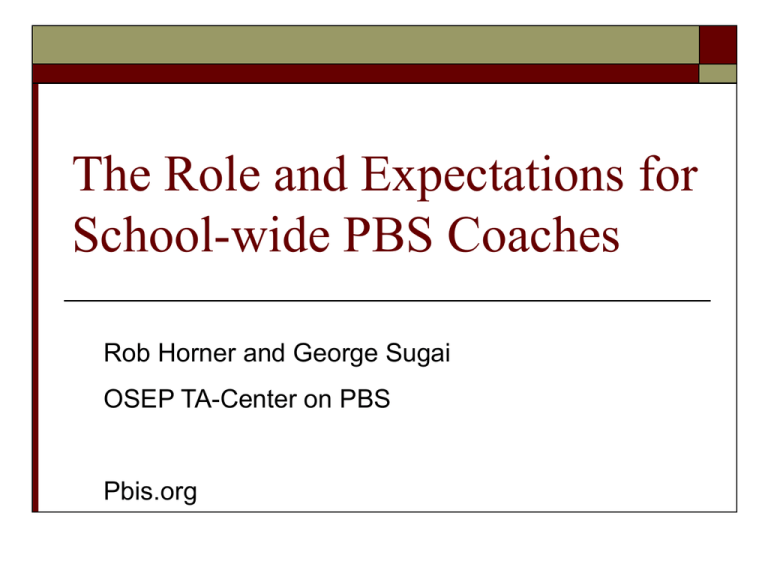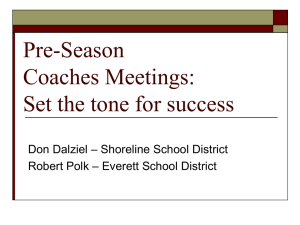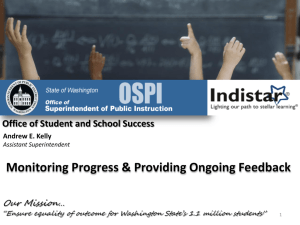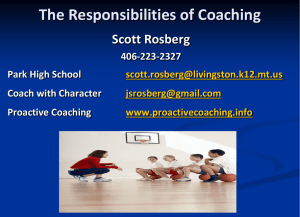coaches0706
advertisement

The Role and Expectations for School-wide PBS Coaches Rob Horner and George Sugai OSEP TA-Center on PBS Pbis.org Objectives Define the role of coaches in implementation of school-wide PBS Define the activities of effective coaches Define the competencies of effective coaches Define the responsibilities of coaches within the Team-Training format. The Main Ideas Whole schools as the unit of behavior support. Prevention as the most effective way to improve behavior in schools All children need behavior support Teaching and supporting appropriate behavior Whole-school effort is foundation for individual student supports Data use as the key to sustainability and improvement. Systems are as or more important as effective practices. Positive Behavior Support Social Competence, Academic Achievement, and Safety OUTCOMES Supporting Decision Making Supporting Staff Behavior PRACTICES Supporting Student Behavior What it Takes to Build Statewide Capacity Coordination Training Local Technical Assistance (Coaches) On-going Evaluation and Adaptation Visibility Funding Political Support Leadership Team Active Coordination Training Coaching Evaluation Local School Teams/Demonstrations Coaching vs. Training Coaching involves active collaboration and participation Small group Build from local competence Sustainable Building Coaching Capacity Selecting Coaches What should coaches bring? “internal” vs “external” coaches How coaches are supported What coaches do What is the impact of effective coaching? Who should be a coach? Internal vs External Internal coaches are employed in the school where they provide support External coaches are employed outside the schools where they provide support (e.g. by district, region (AEA), state). Who should be a coach? Internal Coach External Coach Advantages Knowledge of school Staff relationships Regular access Independent Outside perspective Multiple schools experience Disadvantages Conflicting roles Narrow range of experiences Limited knowledge of school Limited relationships Less frequent access Who should be a coach Coaching Competencies Necessary Preferred Participate in team training Able to attend team meetings at least monthly Effective working with adults Knowledgeable about school operating systems Professional Commitment Knowledge about SWPBS Knowledge about behavior support practices (targeted, individual) Skilled in collection and use of data for decision-making. What Coaches Do Work with team during initial SW-PBS training Meet with new teams monthly on-site Telephone/email contact as needed “Positive” nag Self-assessment (EBS Survey, Team Checklist) Action planning Activity implementation On-going evaluation School self-evaluation efforts State-wide Initiative evaluation efforts (SET) Guide State-wide initiative Feedback to Taskforce What Coaches Do Dissemination of outcomes and effects SWIS Facilitation Implement and support use of data-based decision making. Schedule Areas of Coaching Impact Team Start Up Team Sustainability Technical Assistance Public Relations Statewide support network Local Leadership The Impact of Coaches Initial Implementation Active Capacity Building Help maintain momentum Help with team process Coordinate information Provide access to praise, celebration Provide or obtain critical information/technical support. Active problem solving All staff trainings/orientation Development and use of data for decision-making Systems development Sustainability Transition prompts New training Effective Coaches Are skilled at individual student behavior support practices Functional assessment, person-centered planning Behavior support plan design Evaluation, adaptation and support Are knowledgeable about School-wide PBS systems Are knowledgeable about SWPBS data systems Team Implementation Checklist (TIC) School-wide Evaluation Tool (SET) Office Discipline Referral (ODR…SWIS) Commitment of Coaches Team Support FTE commitment First Year (1-2 teams) (participate in training and planning) Second Year (Maintain initial teams, start 3-5 teams) Future Years (10-15 teams total) 15-25% Roles/Background Behavior Specialists, Special Education Teachers Consultants, Administrators School Psychologists, Counselors, Social Workers Guiding Principles for Effective Coaching Build local capacity Maximize current competence Measure and report; measure and report; measure and report. Build credibility through: Tie all efforts to the benefits for children Emphasize Accountability Never change things that are working Always make the smallest change that will have the biggest impact Focus on valued outcomes Become irrelevant…but remain available (a) consistency, (b) competence with behavioral principles/practices, (c) relationships, (d) time investment. Precorrect for success Specific Expectations Attend and participate in team training Meet with your team(s) at least monthly Monitor and report on team efforts Provide technical assistance as needed Team Checklist EBS Survey Annual Profile/Summary Data Present on School-wide PBS at district, state, national forums. Assist district to build capacity for sustained implementation (re-define your role over time) Meetings with Coordinator and Taskforce for purposes of state-wide planning Assist Teams in Using Data for Decision-making Using Team-Checklist and EBS Survey data for Team Action Planning Using SET data for evaluation Using ODR data for assessment, planning and reporting. Keeping faculty involved through regular data reporting. Questions How will training on functional behavioral assessment and comprehensive interventions be provided? When, where, how will these sessions be provided? Will school districts be notified so coaches can attend? What do you do if you are an “internal coach” with more than one building? What work do we give up to do coaching? What are office discipline referrals (the specific behaviors)? Agenda for Afternoon Questions Comments from Experienced Coaches Using Data for Decision-making Planning for future of SWPBS in Iowa After Lunch Questions Are the studies you provided about academic and behavior supports available on your website? Are there ever students who cannot be successful in public school settings? After Lunch Questions What do we do with kids who are attention seeking?... Or who have behavior that is both attention AND escape maintained? How do we address teachers who have ineffective classroom management skills? Coaches Discussion What makes coaching work well? Recommendations for new coaches starting to support SWPBS schools What barriers have you encountered? What should coaches expect from Alliance? Coaches Self-Assessment (Data, Practices, Systems) Coach Advanced Coach Coordinator/Trainer Linking Academic Skills and Problem Behavior. Kent Moria Jorge Amanda RCT




